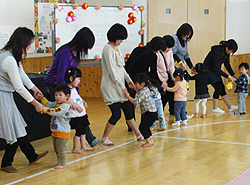 A repeated measures study of 123 Magic parenting programmes was conducted in both countries. Parents completed questionnaires pre-programme and at four-month follow-up to measure the relationship between changes in child behaviour (SDQ), parenting stress (PSI), self-efficacy (TOPSE) and health service utilisation. All instruments were translated into Japanese and tested in a pilot study. Qualitative interviews and focus groups with parents explored parental perceptions of changes in their relationship with their child. The complexity of qualitative analysis was discussed at length during a visit by the Japanese team to the UK in September 2009. This has been an on-going discussion to clarify our findings in both countries and to reach cultural understanding about how services are delivered and about parental expectations and experiences.
A repeated measures study of 123 Magic parenting programmes was conducted in both countries. Parents completed questionnaires pre-programme and at four-month follow-up to measure the relationship between changes in child behaviour (SDQ), parenting stress (PSI), self-efficacy (TOPSE) and health service utilisation. All instruments were translated into Japanese and tested in a pilot study. Qualitative interviews and focus groups with parents explored parental perceptions of changes in their relationship with their child. The complexity of qualitative analysis was discussed at length during a visit by the Japanese team to the UK in September 2009. This has been an on-going discussion to clarify our findings in both countries and to reach cultural understanding about how services are delivered and about parental expectations and experiences.
Data was collected from 63 parents in the UK and 49 parents in Japan. Baseline scores showed a strong correlation between parenting self-efficacy and parenting stress, also parenting stress and child behaviour. This correlation was also strong at four-month follow-up and there was a significant improvement in all measures.
Data from the focus groups supported the findings that parenting programmes have a positive impact on both parent and child outcomes and on parent perceptions of their parenting competence.
This study compared the data from Japan and England in an attempt to increase our global understanding of parenting issues in relation to child health, and to inform public health policy makers in both countries about the potential for improvements in parenting support. Given the current global concerns over child health and social development, (WHO, 2002) early years interventions with parents appear to be a way forward. The results from this study will add to the emerging knowledge base around how community-based support for parents may impact on their confidence as parents and the effect this has on child outcomes.
